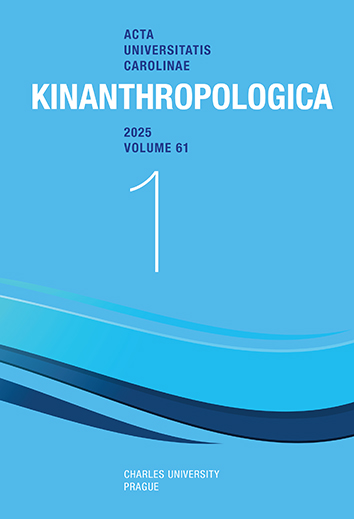Acta Universitatis Carolinae Kinanthropologica (AUC Kinanthropologica) is an international peer reviewed journal for the publication of research outcomes in the humanities, the social sciences and the natural sciences, as applied to kinathropology. It is a multidisciplinary journal accepting only original unpublished articles in English in the various sub-disciplines and related fields of kinanthropology, such as Anthropology, Anthropomotorics, Sports Pedagogy, Sociology of Sport, Philosophy of Sport, History of Sport, Physiology of Sport And Exercise, Physical Education, Applied Physical Education, Physiotherapy, Human Biomechanics, Psychology of Sport, Sports Training and Coaching, Sport Management, etc. The journal also welcomes interdisciplinary articles. The journal also includes reports of relevant activities and reviews of relevant publications.
The journal is abstracted and indexed by CNKI, DOAJ, EBSCO, ERIH PLUS, SPOLIT, SPORTDiscus, and Ulrichsweb.
AUC KINANTHROPOLOGICA, Vol 46 No 2 (2010), 134–147
Czechoslovakia on the XIX Olympic Games in Mexico in Duels with Soviet Rivals
Kristina Jakubcová
published online: 04. 02. 2015
abstract
Czechoslovakia on the XIX Olympic Games in Mexico in Duels with Soviet Rivals The political and safety situation before the XIX Olympic Games in Ciudad de México was complicated. Many countries threatened to boycott the Games because of the participation of apartheid South African Republic. Political disturbances took place not only in the host country, but also in many worlds’ regions and in Czechoslovakia as well. Nevertheless, these circumstances didn’t affect the course of the Games. However, they affected the performance of Czechoslovak sportsmen. Despite of many after the August invasion of Czechoslovakia by troops of the Warsaw Pact protests the aggressors participated in the Games. Similarly, the Czechoslovak team set off to Mexico after a short reflection with a goal to do their best to represent the attacked country. The sportsmen of the occupied country won over an unusual sympathy of the local public already at the opening ceremony. Duels with Soviets, representing occupants in the eyes of the world and Czechoslovak people as well, were often quite escalated. The gymnast Věra Čáslavská or the athlete Miloslava Rezková became winners. On the other hand, additional motivation in form of vengeance was tying the hands of the volleyball team and they lost the final match with the Soviet rival easily. Československo na XIX. oh v soubojích se sovětskými soupeři Politicko-bezpečnostní situace před XIX. olympijskými hrami v Ciudad de México byla komplikovaná. Mnoho zemí hrozilo bojkotem her kvůli plánované účasti apartheidní Jihoafrické republiky. S politickými nepokoji se potýkala pořadatelská země, mnohé světové regiony i Československo. Na průběh samotných her však tyto události vliv neměly. Ovlivnily účinkování československých sportovců. Po srpnové invazi vojsk tzv. Varšavské smlouvy se agresoři přes mnohé protesty her zúčastnili. Stejně tak československá výprava po kratším zvažování situace nakonec do Mexika odcestovala s cílem napadenou zemi co nejlépe reprezentovat. Čechoslováci si jako okupovaná země získali nebývalé sympatie domácího publika již při slavnostním zahájení her. Boje se Sověty, reprezentujícími v očích světa i Čechoslováků okupantské státy, byly mnohdy dosti vyhrocené. Vítězně z nich vyšla gymnastka Věra Čáslavská či atletka Miloslava Rezková. Naopak pro družstvo volejbalistů byla přídavná motivace ve formě pomsty okupantům svazující a ve finále sovětským soupeřům hladce podlehli.
keywords: political situation; military conflicts; Mexico; Soviet Union politická situace; válečné konflikty; Mexico; Sovětský svaz
157 x 230 mm
periodicity: 2 x per year
print price: 190 czk
ISSN: 1212-1428
E-ISSN: 2336-6052
